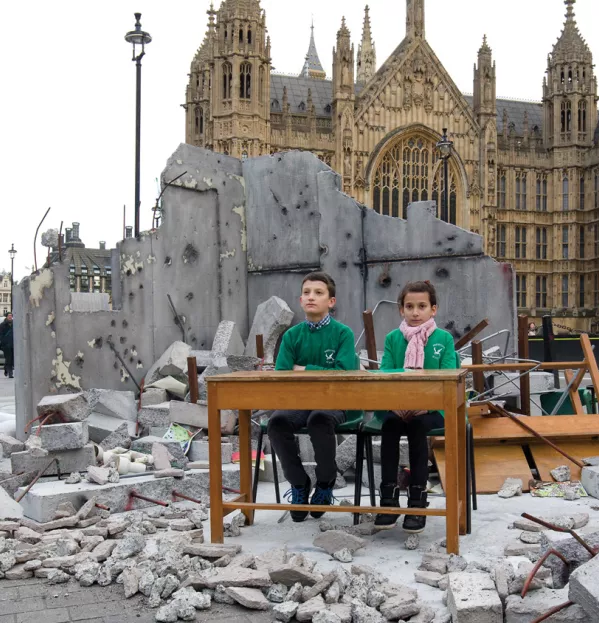Children of war can’t be denied an education

I was born and grew up in a refugee camp in Bethlehem and I now teach children who are traumatised by the long-running conflict in Palestine. That history made the stories of the children who have recently arrived in the UK from Syria particularly moving for me.
On the first day of my visit to the UK last November, I heard some truly harrowing tales from youngsters who have left family behind, been forcibly torn from their homelands and have witnessed appalling savagery and death. In short, none were things that should ever be encountered by children.
I could identify completely with their personal testimonies of hardship and the almost unimaginable scale of their suffering. At a Global Teacher Prize forum in London at the headquarters of the Varkey Foundation, which awards the prize, these children poured their hearts out in front of education professionals, politicians and media representatives. One, 16-year-old Kabir, whose parents and cousins were dead and his brother severely injured, had no choice but to leave his ruined country to join his sister in London. His parents’ dream was that he should get an education. “Even though my parents have now passed away, I want to fulfil their dream of me being someone and getting an education,” he said.
Heart-rending stories
Many of us in the room were moved to tears as we heard the heart-rending stories that these boys had to tell about the horrors they had witnessed and the sheer bravery they had shown as vulnerable children. After struggling for thousands of miles across Europe to get to the infamous “Jungle” camp in Calais, Kabir finally reached Britain with the help of the charity Safe Passage UK.
Settling into life in the UK, however, involved further complications, including a complete lack of information, meaning that his place at college wasn’t confirmed for six months. Another of the children said that he had missed four years of his education. “My fear is of a lost generation - people who have never seen the inside of a classroom,” 17-year-old Mohammed told us. “They’re lost and I’m worried for my country because of that.”
Nothing is more important for these children, who have literally fled for their lives to find a safe haven in the UK and other compassionate European countries, than their education. “I want an education” - it is such a modest thing to ask. These children do not want much from us, and this we should be able to give. Education is a fundamental human right and is essential for the exercise of all other human rights, as the United Nations rightly says.
My fear is of a lost generation who have never seen the inside of a classroom
I told the children whom I met that they needed to keep speaking up about the horrors they had experienced, and about their simple desire for an education. Only when people truly realise the human cost of these conflicts will there ever be enough popular pressure on the politicians who have the real power to bring them to an end. These same politicians have the levers of power over our education and must understand how badly these children want to be educated.
The problem is not going away. As the UN refugee agency UNHCR has said, while 91 per cent of children around the world attend primary school, this rate falls to just 50 per cent among refugee children. Some 84 per cent of adolescents around the world attend secondary school, while just 22 per cent of refugee adolescents get a secondary education; 34 per cent of young people around the world go to university, but just 1 per cent of refugee children do so. They suffer this disadvantage in their most important, formative years.
The opportunity for children to learn should not be allowed to wither away when they are forced to flee their homes.
Make the politicians listen
On my trip to England, I opened the London Stock Exchange and spoke at the University of Cambridge. At both, I saw comparative affluence all around me being taken for granted by those fortunate enough to have grown up with it.
I have been acutely aware of an inescapable truth: as the world speeds forward technologically and economically, we need to understand that by failing to educate refugee children, we are recklessly squandering human capital.
As well as being wrong, it is self-defeating. Educated children grow up to make a major contribution to their societies and to the world as a whole, turning away from the pull of extremism and so many other negative influences that they are faced with.
However, before many refugee children are in a position to learn, we need to treat the trauma they have experienced.
Local authorities need the budgets to deal with this; they should never have to choose between providing social care for frail adults and supporting vulnerable refugee children. Here in the UK, the one thing teachers have that refugee children do not is a powerful voice, and the ear of politicians.
We must all make those people in power understand the destructive costs of failing to educate these refugee children. We must not let them down.
Hanan Al Hroub won the $1 million Global Teacher Prize in 2016. She will be speaking at the Bett and TES Leaders Summit 2017 on Wednesday 25 January. For more details, see tes.com/bett/2017
You need a Tes subscription to read this article
Subscribe now to read this article and get other subscriber-only content:
- Unlimited access to all Tes magazine content
- Exclusive subscriber-only stories
- Award-winning email newsletters
Already a subscriber? Log in
You need a subscription to read this article
Subscribe now to read this article and get other subscriber-only content, including:
- Unlimited access to all Tes magazine content
- Exclusive subscriber-only stories
- Award-winning email newsletters